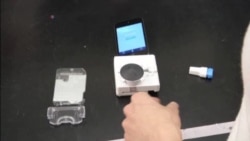Diagnosing sexually transmitted diseases like syphilis and HIV, the virus that causes AIDS, require costly tests. Poor patients living in rural areas are even less likely to be able to receive such tests. So, researchers have developed a mobile phone device that may make the tests less costly and more available. The researchers say the device tells health care workers within 15 minutes whether someone is infected with HIV or syphilis.
Scientists at Columbia University in New York developed the small electronic device to attach to any smartphone. Biomedical engineer Sam Sia is one of the developers of the device, called a dongle. He says the dongle detects the biological markers for both HIV and syphilis and shows the results on the smartphone. Mr. Sia adds that early diagnosis may be a matter of life and death to patients such as pregnant women in rural parts of Africa.
Health care workers can send the test results to a wireless information storage system to give doctors easy access to the disease diagnoses. Immediate treatment of HIV and syphilis can stop the spread of the potentially deadly illnesses.
All of the chemicals used for testing are in small plastic containers that can be used only one time. The device analyzes blood taken from a small cut on the finger.
The dongle was tested on 96 pregnant women in Rwanda. The women were at high risk of passing HIV and syphilis on to their babies. The results of the test were highly accurate. The dongle costs about $34 dollars. Each test container is about $1.50. This is far less than the $18,000 cost for the equipment needed to do a similar blood test in a laboratory.
It took 30 minutes to train Rwandan health care workers how to use the device. Sam Sia says the dongle makes the smartphone test especially useful in developing countries. He says that health care workers can use the tests in a clinic or in rural areas where patients live. He adds that the dongles could also be used to test for diseases such as hepatitis, herpes, and malaria.
Mr. Sia and his research team are preparing for a larger test of the device that the World Health Organization requires for approval.
I’m Jonathan Evans.
Jessica Berman and George Putic reported this story from Washington. Jonathan Evans wrote it for Learning English. Mario Ritter was the editor
_______________________________________________________________
Words in This Story
accurate – adj. free from mistakes or errors
analyze – v. to study something closely and carefully; to learn the nature and relationship of the parts of something by a close and careful examination
diagnose – v. to recognize a disease, illness, etc. by examining someone





